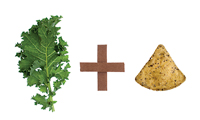 I’ve been a vegetarian in some shape or form for twenty-five years now. My food journey began when I traveled to France as an exchange student at sixteen and I lived with a family who couldn’t afford meat. Prior to this, my meals revolved around animal products. While I didn’t become a vegetarian immediately, the seed had been planted. When I left for college the following year, I learned about the negative ramifications of factory farming – the industrialized production of livestock in confinement which relies on antibiotics and pesticides to combat the diseases that arise as a result of confinement – and the rest, as they say, is history.
I’ve been a vegetarian in some shape or form for twenty-five years now. My food journey began when I traveled to France as an exchange student at sixteen and I lived with a family who couldn’t afford meat. Prior to this, my meals revolved around animal products. While I didn’t become a vegetarian immediately, the seed had been planted. When I left for college the following year, I learned about the negative ramifications of factory farming – the industrialized production of livestock in confinement which relies on antibiotics and pesticides to combat the diseases that arise as a result of confinement – and the rest, as they say, is history.
Since then, my dietary identity has run the gamut – everything from a vegan (someone who eats a solely plant-based diet) to a pescetarian (someone who eats seafood as well as eggs and milk). While I’m married to a meat eater, our children are vegetarians. I wanted this lifestyle for them not only because I believe it’s better for their health, but also because I believe science shows that it’s better for our planet. I made an early deal with my husband the meat eater that if our kids ever became sickly, they’d give it up. Our sixth grader hasn’t missed a day of school due to illness since kindergarten, so Needless to say vegetables abound.
What does a healthy vegetarian diet look like?
You can’t just eliminate meat, eating pasta and salads until your heart’s content. Your diet should include nuts and beans in order to get the protein your body needs. My daughters are lacto-ovo vegetarians, which means they eat dairy and eggs, too. While pizza is certainly plentiful at our house, their food favorites include hummus, edamame, and tofu tacos. They snack on homemade kale chips. Combining these protein-rich foods with a variety of fruits and vegetables provides my children with a balanced diet. That’s why, in 2009 the American Dietetic Association took the following position:
“Appropriately planned vegetarian diets, including total vegetarian or vegan diets, are healthful, nutritionally adequate, and may provide health benefits in the prevention and treatment of certain diseases. Well-planned vegetarian diets are appropriate for individuals during all stages of the life cycle, including pregnancy, lactation, infancy, childhood, and adolescence, and for athletes.”
Why do people become vegetarian?
Kim, of Providence Forge, is a yoga instructor, who has been a vegetarian for ten years now. She made the switch After learning about a wide spread E. coli contamination in chicken. Her son, who was born shortly after, is also a lacto-ovo vegetarian. Kim says, “It was not my goal to make him a vegetarian. He’s just a picky eater, who has always eaten whatever I do.” Since Kim’s husband eats meat, she’s willing to prepare it for her son, but he has no interest. “He eats a lot of raw spinach, which I know has had its own contamination issues, but I still feel it’s healthier.”
One of the biggest reasons people become vegetarian is to improve their health. Last year, scientists in California analyzed the diets of 73,300 Seventh-day Adventists who typically practice vegetarianism and concluded that vegetarians were less likely to die from any cause compared to those who ate meat. These findings follow a comprehensive study from the University of Oxford, which included nearly 45,000 people from England and Scotland, and found vegetarians had a 32 percent lower chance of being hospitalized or dying from heart disease. According to the American Dietetic Association, vegetarians also tend to have lower overall cancer rates.
This is one of the reasons Jennifer of Quinton is more mindful about her family’s food choices. Her sister was diagnosed with breast cancer last summer. “We haven’t eaten red meat in a long time, but now I limit dairy and other types of meat, too.” Jennifer explains, “Since we’re on a limited budget, buying hormone-free and vegetarian-fed meat can get expensive. So we only eat poultry once a week.”
One of the biggest challenges of this lifestyle, Jennifer claims, is access to quality food. “We would eat more seafood if we could, but I only want to buy it if it’s caught and packaged in the United States, which is harder to find than you’d think.” Why does it matter where your seafood comes from? “Well, other countries don’t have the same environmental standards we do, so the fish could be contaminated.”
Still, Jennifer maintains the benefits of this vegetarian lifestyle outweigh the inconveniences. “It gives me a chance to cook with fresh herbs I wouldn’t otherwise. As a result, my kids are trying new things. Their taste buds change as I introduce new flavors. It’s not the same old mac ‘n cheese.”
Sudha of Richmond has been lactovegetarian, which means she eats dairy, all her life. Hindu by birth, her vegetarian diet was originally for religious reasons; however, She continues to be a vegetarian as part of a healthy lifestyle. Sudha explains, “I don’t buy meat, but my husband and younger daughter will eat chicken when we’re out.” Sudha’s older daughter chose to be a vegetarian when she was five. Influenced by her religious studies, Sudha says, “My older daughter no longer wanted to eat chicken nuggets.”
To help her children make healthy food choices, Sudha leaves out cut vegetables on the table for them to snack on after school. However, since her younger daughter enjoys junk food, once a month, Sudha lets her select the snacks for the week. Like all middle school-aged kids, “She likes having a say in what she eats,” Sudha explains, and the West End mother simply balances her daughter’s diet by serving fruits and banana chips the rest of the month.
This kind of conscious living is becoming more popular than ever with families. It’s part of a movement journalist Graham Hill, a self-described “weekday vegetarian,” fully supports. Top chef Curtis Stone is a fan of Meatless Mondays, an initiative from the Johns Hopkins Bloomberg School of Public Health. Most individuals don’t come to vegetarianism because of animal cruelty, like I did – even though, as Hill, points out, “ten billion animals raised in factory farms each year live in conditions we’d never want for our cats and dogs.” The majority of people make the choice to avoid foods with a face in an effort to reduce their risk of diabetes or lower the rate of obesity. While being a vegetarian is easier than it ever has been, just 10 percent of Americans label themselves as such, and even fewer children ages eight to eighteen are vegetarian.
You might be like Hill, whom in a recent TED talk said he couldn’t imagine the finality of having his last hamburger. The beauty in cooking and eating trends like Meatless Mondays and weekday Vegetarianism is the realization that you don’t have to commit one hundred percent for your food choices to positively impact your health and your planet.
So what does vegetarianism have to do with the environment?
According to the United Nations Food and Agriculture Association, greenhouse gas (GHG) emissions associated with livestock supply chains account for 14. 5 percent of all human-caused GHG releases. Between feed production and the processing and transportation of animal products, meat production is playing a significant role in climate change. Couple this with the fact that beef production requires a tremendous amount of water – some estimate a hundred times more than for the production of vegetables – and cutting back on meat consumption also means conserving our limited supply of clean water.
To be honest, I don’t know if my children will remain vegetarians. One time, when my younger daughter was five, she tried a piece of pepperoni at a friend’s birthday party and declared it delicious. I told her it was made from pig, and she announced, “I’m just going to eat the little old lady pigs that are about to die.” And maybe, someday she’ll find a way to do that. But right now, vegetarianism is the choice I make for us for a variety of reasons. I’ve had people question whether it’s right for me to choose this lifestyle for them, but as far as I’m concerned, raising my children vegetarian is no different than raising them a specific religion. As a parent, it’s what I believe is in their best interest. Ultimately, whether it’s for one meal, one day, one season, or one week out of the month, the more we veg out, the healthier we’ll all be.
Make Victoria’s Homemade Kale Chips
 Wash the kale well, as leafy greens are known for carrying dirt and debris in crevices. I fill a pot with water and submerge the kale in it while I preheat my oven to 250 degrees. Then, I tear the kale leaves into pieces – the smaller the pieces the faster they’ll cook – and place them on a cookie sheet. I brush them with olive oil, sprinkle them with sea salt, and bake them until crisp, usually 30 to 40 minutes, flipping them half-way through (if I remember). My friend, Andrea, likes to add lime juice and chipotle powder to her kale chips for added flavor. She also prefers to season hers in a plastic bag, shake-and-bake style, before baking.
Wash the kale well, as leafy greens are known for carrying dirt and debris in crevices. I fill a pot with water and submerge the kale in it while I preheat my oven to 250 degrees. Then, I tear the kale leaves into pieces – the smaller the pieces the faster they’ll cook – and place them on a cookie sheet. I brush them with olive oil, sprinkle them with sea salt, and bake them until crisp, usually 30 to 40 minutes, flipping them half-way through (if I remember). My friend, Andrea, likes to add lime juice and chipotle powder to her kale chips for added flavor. She also prefers to season hers in a plastic bag, shake-and-bake style, before baking.



